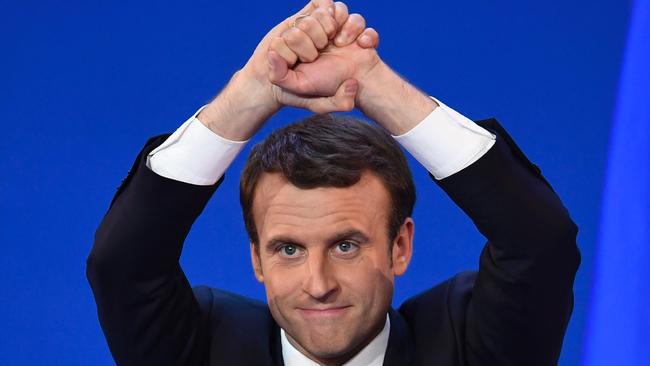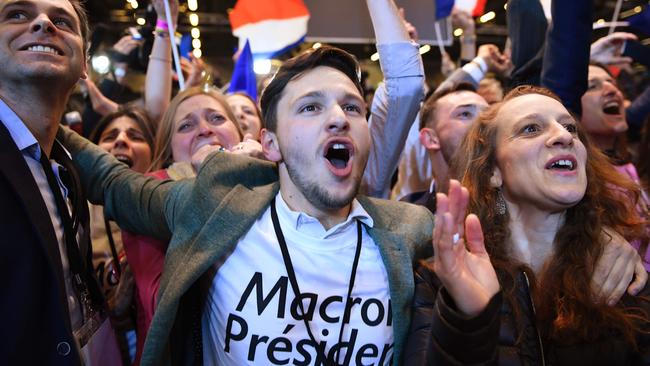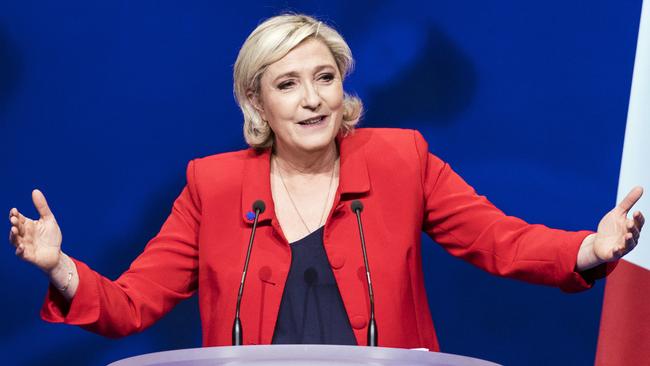Presidential vote for independent centrist Emmanuel Macron suggests France eyes the middle road
FRENCH voters vow to go their own way by sticking to the centre, writes Paul Gilder.

Business
Don't miss out on the headlines from Business. Followed categories will be added to My News.
ONCE again France has been so, well, French.
Rather than simply echoing the populist stance taking hold on both sides of the Atlantic Ocean as first Britain and then the US turned on the establishment, la Republique has revolted in its own way — a French twist if you will.
In all but anointing independent centrist Emmanuel Macron as its next president at Sunday’s first-round poll, France has indicated that it is still pro-Europe, but won’t stand for more of the same stagnant leadership at home.
While Macron garnered 24 per cent of the vote and far-right candidate Marine Le Pen 22 per cent, observers give her little chance of succeeding in May 7’s head-to-head battle, with political rivals on the left and right already backing in Macron.
That she was unable to poll more strongly in the wake of another terror attack late last week, in which a police officer was killed on the Champs Elysees, was also telling, observers say.
The French economy hasn’t played ball with Le Pen either.
Corporate profits are rising, business confidence is growing and a spurt of inflation growth last year handed shoppers the slimmest of wage gains.
The workforce has not rebounded but the youth unemployment rate has been steadily sliding since peaking at 25 per cent in August.

While still high by global standards, it is not the chronic problem that might once have had younger voters rallying en masse to the far-right’s protectionist mantras.
And while outgoing president Francois Hollande chose not to stand again because of his Socialist Party’s lack of progress on labour market reforms, the result from the first round of voting appears one of retaliation against the status quo rather than a marked shift towards nationalism.
That has manifested in two ways — a resounding nod to a historically unencumbered centrist in Macron and a scything of the vote for the establishment.
Centre-left candidate Benoit Hamon and the centre-right’s Francois Fillon have been pushed to the sidelines and ultimately forced to support Macron’s candidacy.
“Globalisation’s losers are taking it out on the political system,” says The Airport Economist author Tim Harcourt.
“There’s been a fusion between political correctness and identity politics which is an issue many ruling parties are dealing with.
“It’s another example of (US Democrat candidate) Hillary Clinton’s ‘deplorables’ having their say.”
It has allowed Macron, 39 — an articulate and photogenic former banker — to capture the middle ground, his support for immigration and free trade striking the balance between economic growth and preserving local jobs.
His decision in August to quit the economic ministry within Hollande’s flailing government and form his own movement, En Marche, has delivered a candidate perceived as free from the yoke of Socialist Party failings.
While Donald Trump’s pro-US jobs rhetoric won over voters in the “rust belt” states of Michigan, Pennsylvania and Wisconsin, Macron is seen as representative of “tomorrow’s France”.
That France is one that still espouses a tight bond with its European neighbours but is not prepared to shut the doors to outsiders.
A Macron victory would also provide a huge fillip for the euro, which has already surged this week in anticipation.
Mr Harcourt says that for all its domestic challenges, France believes it is better off sticking with the common currency despite the long-term benefits that reverting to a heavily discounted franc could bring to its exports.
Central to Macron’s pitch to voters is a vow to cut a better deal for France within the union, which has long been criticised as a vehicle for Germany to push austerity measures onto its heavily indebted neighbours.
Macron wants to rebrand the continent’s chief bailout fund, the European Stability Mechanism, into a European Monetary Fund, while also installing a eurozone budget and finance minister.

While still in the race, Le Pen is unlikely to have enough votes for her National Front party to win control of France’s National Assembly, analysts say.
That means that even if she were to win the presidential race, the French parliament would be unlikely to approve her proposed referendum on a potential exit of France from the European Union.
Still, a Le Pen victory would have significant ramifications, AMP Capital chief economist Shane Oliver says.
“(It) won’t stop French citizens and investors generally from fearing that she will find a way to exit the euro if she wins the presidency.”
And while Australia is largely confined to interested onlooker in France’s case, Mr Harcourt says the lesson for our politicians is clear: find a message that resonates with the electorate and stick with it.
“That’s what the hope was for (the Coalition switching to) Malcolm Turnbull,” he says.
“Eighteen months ago, you wouldn’t have thought he’d abolish 457 visas. Eventually you do have to govern from the middle.”
Ah, but that would be so French.


